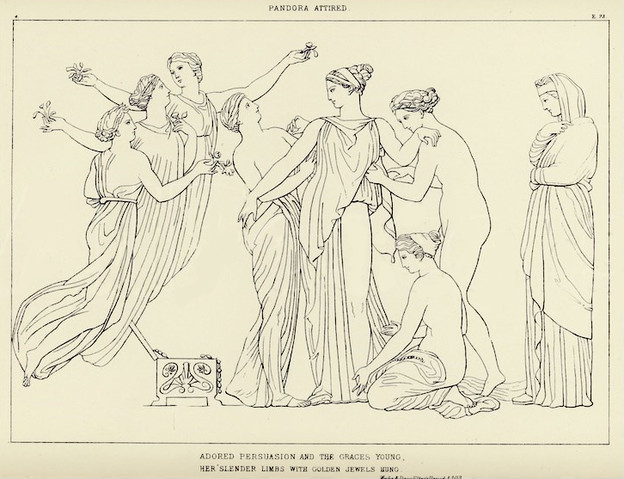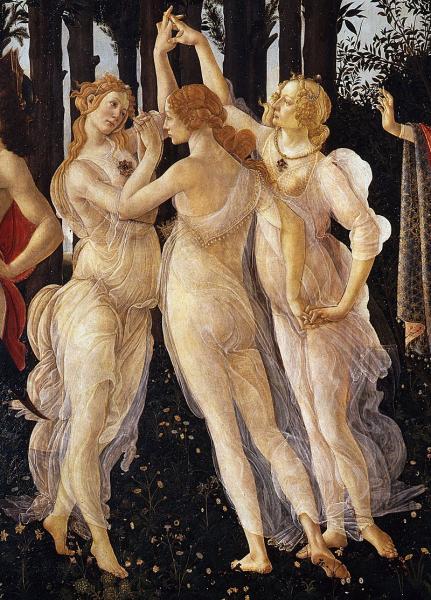Kharis
Pt. 11

In his impressively exhaustive study on gift exchange and market economy, The Price of Truth: Gift, Money, and Philosophy, Marcel Hénaff puts pressure on the gift (dosis) / countergift (antidosis) coupling by making the provocative claim that there’s no such thing as a “gift economy.” According to Hénaff the gift is built on “symbolic” rather than “market” exchange, and as a result, its purpose is “not to acquire or accumulate goods but to use them to establish bonds of recognition between persons or groups.”[1] He claims that — unlike Bataille’s economy built on the destruction of utility and surplus — ceremonial gift exchange is really about building and maintaining social bonds through very public displays of reciprocal recognition, which ultimately “makes it possible to risk making a move toward the other while obligating the other to risk making a move in return. It is a gamble on the possibility of going outside oneself while imposing reciprocity.”[2] As a symbolic economy, then (because, despite Hénaff’s objection, symbolic meaning is still a resource that requires management, market or no), the gift is intended to strengthen relationships through resources like “physical goods (because they are considered precious) but also persons (as in matrimonial alliance), gestures, words, dances, music, celebrations, songs, or feasts.”[3] On the one hand, gift giving may require a level of reciprocal exchange, sure, especially in the case of, say, matrimonial alliance, but more often than not, the gift is meant to be a unilateral gesture. Here one can imagine the unconditional love a parent shows her child: while this gift may not require response, it establishes an unspoken, immaterial debt, especially when the radical nature of the gift transcends one’s ability to match it.
Of unilateral gifts, Hénaff claims that kharis or “grace” is the most baroque and provocative form. Kharis has an incredibly rich and complicated conceptual history that snakes through Greek, Roman, and Christian anthropology and ontotheology, establishing the very foundation of what we call “gift economies” today. Kharis (or charis) can refer to the gracefulness of a gesture, both somatic and social: the alluring beauty of a body in motion, or the social gesture of giving and/or receiving thanks. Accordingly, “[k]haris designates, above all, the pleasure provided by something and then the charm or beauty of this thing (object or action) […] and ends up indicating favor, kind deed, or gift.”[4] As a result, we can give gracefully, receive gracefully, and we can even distribute kharis itself, a “kharis-gift” paid as a public gesture of respect and honor. In the fourth and third centuries B.C.E., these various forms of grace were often personified by the Charities — Aglaea (“Splendor”), Euphrosyne (“Good Cheer”), and Thalia (“Festivity”) — who are often pictured dancing gracefully in a circle, often with gifts in hand, arms resting on each other’s shoulders in an embrace of mutual recognition. Scholar Bonnie MacLachlan suggests, in her study The Age of Grace: Charis in Early Greek Poetry, that


[T]he Charites personified reciprocal charis. […] [Their] entwined arms represented an unbroken chain of good deeds that return upon the donor. The eldest, most dignified, was the donor; the others represented the grateful recipient and the return-giver. All three were young, because good deeds, ever recalled and renewed, never grow old. All three were maidens, as gifts must never be spoiled or corrupted. They were unclothed, so as to be uninhibited in their giving and receiving. This dance was the incarnation of beneficia (kindnesses) for the Stoics: The goddesses in distributing charis personified good deeds freely given, received, and returned.[5]
As such, the Charites were meant to personify the grace inherent in a charitable gift, giving freely and liberally, often in such a way that the public conferral of kharis would bestow with it the greater gifts of honor and glory.
While in the Christian tradition God’s grace is always unilateral (because the child cannot possibly respond in kind to the father’s infinite generosity), in ancient Greece kharis always demanded due response. For his part, Aristotle “advised the erection of a temple to the Charities in a prominent place in the city, to ensure reciprocal giving, for this he says, is the distinguishing feature of charis. From the Charities, then, we learn that charis-pleasure was not private: it entailed enjoyment that was mutual, reciprocal.[6] For example, when Agamemnon is made to relinquish his concubine Chryseis in Book 1 of the Iliad, he chooses to replace her with Briseis, a Trojan princess “given” to Achilles “as kharis” in honor of his heroism. Stripping away this kharis was such a profound dishonor that Achilles petulantly withdrew from the battle and stayed gone until the death of Patroklos. Agamemnon finally comes to his senses (“I was mad, I myself will not deny it”) when it grows clear that the Achaians will lose the war without Achilles’s contribution, and as a result, he sets out to restore his kharis, offering tripods, gold, cauldrons, horses, and women, specifically Briseus, her "honor intact.”[7] While Hénaff suggests that kharis-gifts were intended to be entirely asymmetrical, MacLachlan makes it clear that “[t]he exchange of charis-favors was founded upon a very general psychological phenomenon, the disposition to return pleasure to someone who has given it. […] A benefaction called for a suitable return, and reprisals might be taken when the anticipated reciprocity did not occur.”[8]
It wasn’t until Seneca's De Beneficiis and his Christian coeval the apostle Paul (in his “Letter to the Romans”) that the idea of reciprocity was ultimately defenestrated due to the uniquely unilateral nature of the gift. In Paul’s radical witness, to attempt to reciprocate God’s gift is simply laughable: “This gift is viewed as so absolute and unconditional that its recipient is not capable of reciprocating it. Any possible countergift would be trivial.”[9] Because no response is adequate, the consequence is a kind of infinite debt thanks to the nature of prevenient grace. Henry Adams vividly illustrates this point in his Mont St. Michel and Chartres, where God figures as a powerful “Prime Motor” to which each discrete human is connected. If God is an engine, grace is an especially powerful burst of energy, given freely and without the possibility of compensation. He writes,
[St. Thomas Aquinas’s] Prime Motor was very powerful, and its lines of energy were infinite. Among these infinite lines, a certain group ran to the human race, and, as long as the conduction was perfect, each man acted mechanically. In cases where the current, for any reason, was for a moment checked, — that is to say, produced the effect of hesitation or reflexion in the mind, — the current accumulated until it acquired power to leap the obstacle. […] Yet there are cases where the conductor is capable of receiving an increase of energy from the Prime Motor, which enables it to attain the object aimed at. In dogma, this store of reserved energy is technically called Grace. In the strict, theological sense of the word as it is used by Saint Thomas, the exact literal meaning of Grace is “a motion which the Prime Motor, as a supernatural cause, produces in the soul, perfecting freewill.” It is a reserved energy, which comes to aid and reinforce the normal energy of the battery.[10]
While Adams, too, might echo Paul’s exhortation that “By the grace of God, I am what I am,” his metaphor too neatly settles what, for the Christian tradition, is a very complex (and somewhat muddled) theological concern: To whom, specifically, is grace granted? To some? To all? Infidels and charlatans? Christian, Jew, and gentile? Must one believe to receive? Can one ascend to heaven without grace, on the merit of acts alone? Can grace be earned? Can it be lost through sin? Is grace the product of fidelity, deeds, devotion, or does the sheer fact of corporeal birth determine its distribution?
Thanks to more contemporary readings of Paul’s eschatology, like Giorgio Agamben’s lecture series The Time That Remains, Paul’s understanding of kharis is restored to its full iconoclasm, more rupture than reciprocity, and it’s due to this messianic caesura that Paul’s conception of kharis harbors value for a contemporary understanding of the poem. For Paul, grace cannot hinge on reciprocity (even amongst equals), and not only because the power of God’s grace is unilateral: the truth is that the vertical bestowal of grace troubles horizontal reciprocity as such, at its very core. For Agamben, “Grace does not provide the foundation for exchange and social obligations; it makes for their interruption. The messianic gesture does not found, it fulfills.”[11] The grace of God saturates human nomos (and the maintenance of lateral social bonds, more generally) — it renders profane obligation inoperative by fundamentally altering our terms of service — and as a result, it functions in “pure excess over every prescription, grace without concept or appropriate rite.”[12] In his lecture course Saint Paul: The Foundation of Universalism, Alain Badiou writes, “Grace, consequently, is not a ‘moment’ of the Absolute,” as it was for Hegel. “It is affirmation without preliminary negation; it is what comes upon us in caesura of the law. It is pure and simple encounter.”[13] Accordingly, in the fosse between pistis (faith) and nomos (law), the subject’s fidelity to the event recalibrates the nature of the real by fundamentally reconfiguring the situation (read: umwelt). The subject is transformed by kharis in that she is renewed in her fidelity to its occurrence “without being couched in any predicate.” Grace “is translegal, that which happens to everyone without an assignable reason. Grace is the opposite of law insofar as it is what comes, without being due.”[14] Kharis, then, comes upon the subject haphazardly, without plan, motive or telos.
As a result, Paul’s conception of kharis is especially instructive for our understanding of the poem because the event of grace is the event of the poem itself. We’ve described the way the poem cuts through world(s), a caesura that disrupts the law by saturating world(s) in excess of themselves, creating an umwelt that bridges the radical alterities of writer/reader and reader/writer without collapsing one into the other. For Paul, unilateral grace disrupts the world of the subject in such a way that it undercuts the law of the diurnal, fundamentally recasting what it means to engage in the world using the poem's lens as guide. As event, it recasts the situation in such a way that the break in “splace” (“space of placement”) points to an immanently “transcendent” truth that exists just outside the situation's threshold. Engaging with the poem means allowing it to fundamentally retool the real through the very nature of our engagement. For Badiou “‘Grace’ means that thought cannot wholly account for the brutal starting over on the path of life in the subject, which is to say, for the rediscovered conjunction between thinking and doing. […] ‘Grace’ names the event as condition for an active thought.”[15] Fidelity to the event of the poem means accepting that its reconfiguration of the real also fundamentally alters the evolution of the subject and, by extension, her ability to make, alter and inhabit world(s).
While the poem is certainly a unilateral gift that links writer(/reader) to reader(/writer), it can never do so “reciprocally” because its “truth” variously materializes for different readers in different forms with radically different meanings. Further, because what ultimately constitutes “the poem” — its work — is exceedingly difficult to reify, it’s impossible to name the debt to pay. As generosity and care, the poem extends itself toward the reader as a cut in the real, and by responding to its call, the reader’s generosity completes the poem’s work, makes the poem mean. Care and reciprocity fundamentally transform the subject in the lightning flash of surplus asking her to refract, only to return to herself as a witness to the poem’s grace.
1. Marcel Hénaff, The Price of Truth: Gift, Money, and Philosophy (Stanford, CA: Stanford University Press, 2010), 18.
2. Hénaff, 136.
3. Hénaff, 153.
4. Hénaff, 245.
5. Bonnie MacLachlan, The Age of Grace: Charis in Early Greek Poetry (Princeton, NJ: Princeton University Press, 1993), 51.
6. MacLachlan, 5. Italics mine.
7. Homer, The Iliad (Chicago: University of Chicago Press, 1951), 205.
8. MacLachlan, 7.
9. Hénaff, 248.
10. Hénaff, 244.
11. Henry Adams, Novels; Mont Saint Michel; The Education (New York: The Library of America, 1983), 688.
12. Giorgio Agamben, The Time That Remains: A Commentary on the Letter to the Romans (Stanford, CA: Stanford University Press, 2005), 124.
13. Alain Badiou, Saint Paul: The Foundation of Universalism (Stanford, CA: Stanford University Press, 2003), 57.
14. Badiou, 66.
15. Badiou, 76-77.
16. Badiou, 84.
Prolegomena to (Any Future) Process Poetics